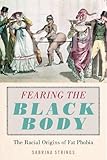Fearing the Black Body : The Racial Origins of Fat Phobia / Sabrina Strings.
Material type: Computer filePublisher: New York, NY : New York University Press, [2019]Copyright date: ©2019Description: 1 online resource : 41 black and white illustrationsContent type:
Computer filePublisher: New York, NY : New York University Press, [2019]Copyright date: ©2019Description: 1 online resource : 41 black and white illustrationsContent type: - 9781479891788
- African American women -- Social conditions
- African American women-Social conditions
- Feminine beauty (Aesthetics) -- Social aspects -- United States
- Feminine beauty (Aesthetics)-Social aspects-United States
- Obesity -- Social aspects -- United States
- Obesity-Social aspects-United States
- Overweight women -- United States -- Social conditions
- Overweight women-United States-Social conditions
- SOCIAL SCIENCE / Sociology / General
- American exceptionalism
- Aryan supremacy
- British history
- Enlightenment
- John Harvey Kellogg
- Protestantism
- Puritanism
- Renaissance art
- beauty
- blackness
- body mass index
- diets
- embodiment
- ethnic studies
- eugenics
- fat stigma
- fat studies
- health disparities
- history of medicine
- history of science
- immigration
- obesity
- race
- racism
- slavery
- sociology of medicine
- thin ideal
- whiteness
- women’s history
- women’s studies
- 305.48896073
- HQ1220.U5 S77 2019eb
- online - DeGruyter
| Item type | Current library | Call number | URL | Status | Notes | Barcode | |
|---|---|---|---|---|---|---|---|
 eBook
eBook
|
Biblioteca "Angelicum" Pont. Univ. S.Tommaso d'Aquino Nuvola online | online - DeGruyter (Browse shelf(Opens below)) | Online access | Not for loan (Accesso limitato) | Accesso per gli utenti autorizzati / Access for authorized users | (dgr)9781479891788 |
restricted access online access with authorization star
http://purl.org/coar/access_right/c_16ec
Winner, 2020 Body and Embodiment Best Publication Award, given by the American Sociological AssociationHonorable Mention, 2020 Sociology of Sex and Gender Distinguished Book Award, given by the American Sociological AssociationHow the female body has been racialized for over two hundred years There is an obesity epidemic in this country and poor black women are particularly stigmatized as “diseased” and a burden on the public health care system. This is only the most recent incarnation of the fear of fat black women, which Sabrina Strings shows took root more than two hundred years ago.Strings weaves together an eye-opening historical narrative ranging from the Renaissance to the current moment, analyzing important works of art, newspaper and magazine articles, and scientific literature and medical journals—where fat bodies were once praised—showing that fat phobia, as it relates to black women, did not originate with medical findings, but with the Enlightenment era belief that fatness was evidence of “savagery” and racial inferiority. The author argues that the contemporary ideal of slenderness is, at its very core, racialized and racist. Indeed, it was not until the early twentieth century, when racialized attitudes against fatness were already entrenched in the culture, that the medical establishment began its crusade against obesity. An important and original work, Fearing the Black Body argues convincingly that fat phobia isn’t about health at all, but rather a means of using the body to validate race, class, and gender prejudice.
Mode of access: Internet via World Wide Web.
In English.
Description based on online resource; title from PDF title page (publisher's Web site, viewed 26. Mrz 2024)


